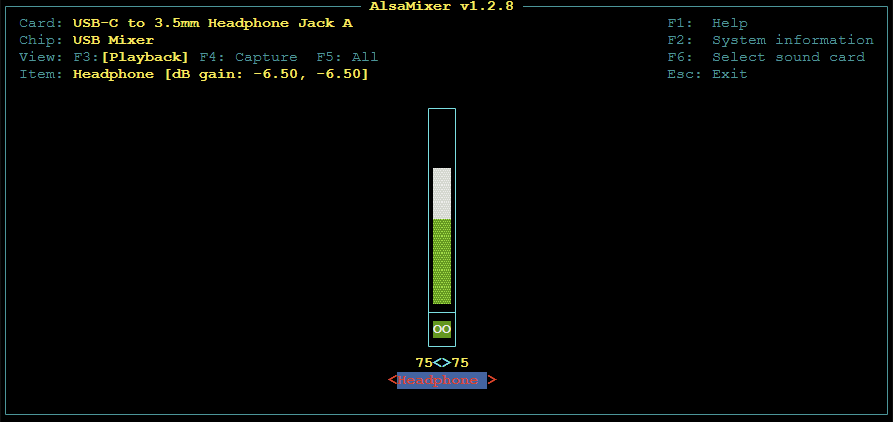Raspotify + Proxmox LXC: Audio device passthrough
Setting up and passing an audio device to Raspotify in a Proxmox Debian LXC.

Raspotify is a popular open-source Spotify Connect client designed to "just work" on a Raspberry Pi. Proxmox is a popular open-source server virtualization solution that simplifies container and virtual machine management. This post details how I run Raspotify inside a Debian LXC, using an audio device shared from the host machine. I assume a reasonable level of Linux and Proxmox knowledge.
Creating the Debian LXC
I use tteck's famous scripts to quickly set up Proxmox containers and services. This one sets up a Debian 12 LXC: https://tteck.github.io/Proxmox/#debian-lxc. As always, exercise caution when executing scripts from the internet.
Take note of the numeric ID of the given container, I'll refer to it as <CTID>.
Finding the audio devices
In Linux, /dev/snd is a directory that contains device files related to the sound subsystem of the operating system. These files are used to interface with the sound hardware of the computer. The three that we're interested in are:
pcmC0D0p, a PCM playback device for the first sound card (Card 0, Device 0).controlC0, used for controlling various mixer and sound card parameters for Card 0.timer, used for timing purposes in audio applications.
Run ls -l /dev/snd to check that these files exist; we'll need to give our LXC access to them.
Passing through the audio devices
Since PVE 8.1, we can pass through devices using the following syntax: pct set <CTID> -dev<n> /dev/path/to/file.
In our case we need to pass through three devices.
pct set <CTID> -dev1 /dev/snd/pcmC0D0p
pct set <CTID> -dev2 /dev/snd/controlC0
pct set <CTID> -dev3 /dev/snd/timer
Alternatively, you can edit the configuration file for the container, store in /etc/pve/lxc/<CTID>.conf. Mine looks like this:
arch: amd64
cores: 1
dev1: /dev/snd/controlC0
dev2: /dev/snd/pcmC0D0p
dev3: /dev/snd/seq
dev4: /dev/snd/timer
features: keyctl=1,nesting=1
hostname: raspotify
memory: 2048
net0: name=eth0,bridge=vmbr0,hwaddr=AB:12:CD:34:EF:56,ip=dhcp,type=veth
onboot: 1
ostype: debian
rootfs: local-lvm:vm-CTID-disk-0,size=2G
swap: 512
unprivileged: 1
Reboot the container to apply your changes.
Setting up the container
Log in to the container.
Fixing the audio devices
I found that the devices were owned by the root group instead of the audio group.
- Check who owns the files with
ls -l /dev/snd. If you seeroot audiothen that's great - skip the following steps. If you're like me and seeroot root, then continue. - Run
chown root:audio /dev/snd/*to fix the device permissions, these will be reset on every boot. - Set up a crontab script to fix the permissions on boot.
- Run
crontab -e, and press enter to confirm that we want to use thenanotext editor. - Append the following to the bottom of the file:
@reboot chown root:audio /dev/snd/*. - Save your changes and exit by pressing
Ctrl+X, thenyto confirm.
- Run
Install Raspotify
Follow the Raspotify instructions to install it.
curl -sL https://dtcooper.github.io/raspotify/install.sh | sh
By default, the user running Raspotify is not in the audio group.
- Check who is running
librespot(the underlying Raspotify library) with:ps -o uname -p $(pgrep librespot). In my case, the user israspotify. - Then add that user to the
audiogroup:usermod -aG audio raspotify. - Optionally, edit the config file,
/etc/raspotify/conf. - Reload Raspotify:
service raspotify restart.
🎉 Woohoo, you made it! You should now be able to play music 🎉
Troubleshooting
If everything went to plan then you wouldn't be reading this. But it's never that easy, is it?
Volume too low?
Run alsamixer and then use the arrow keys to adjust the system volume. The default volue is 50%.

Still too low? Change the LIBRESPOT_NORMALISATION_PREGAIN option in /etc/raspotify/conf to a larger number.
Helpful commands
A few bonus commands:
aplay -l: lists all hardware devices handled by ALSA.librespot --device ?: lists devices with their supported format and sample rates.speaker-test -twav -c6: plays a not-deafening sound on the default ALSA device.